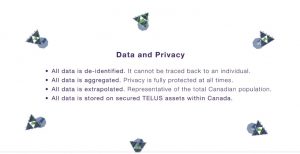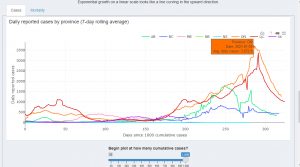“It is a capital mistake,” said the great fictional detective Sherlock Holmes, “to theorize before one has data.”
But to make informed decisions based on real-world information is to use data for good.
And when advanced analytics are used to de-identify that data so that various levels of government and public agencies can make better decisions based on that data without jeopardizing the privacy and security of the sources of that data, well, that’s award-winning!
The case in point is Canadian telecom giant TELUS, and the Privacy Innovation Award it received from the International Association of Privacy Professionals (IAPP) in recognition of its Data for Good program.
Data for Good makes it possible for health authorities and qualified academic researchers to use de-identified data from TELUS to help stop the spread of COVID-19 without compromising the personal privacy of Canadians.
The in-house TELUS Insights business service has in fact been working for several years on how to best use accumulated data to solve problems and assess opportunities, while protecting the privacy of customers (the providers of all that data).
But the pandemic brought an immediate need for reliable and actionable results.
Together with its Data and Trust team, fundamental questions about how to use data properly were addressed so that the impact of the virus could be measured and predicted more accurately.
Those efforts were reflected in the award to and citation of Data for Good by the IAPP, but also in the fact that Canada’s Natural Sciences and Engineering Research Council (NSERC) worked directly with TELUS on efforts to reduce the spread of COVID-19.
Under that agreement, TELUS would share insights with NSERC researchers free of charge and provide supervised and guided access to strongly de-identified and aggregated network mobility data to be used by NSERC-eligible researchers studying and assessing the COVID-19 crisis.

Pam Snively, Chief Data & Trust Officer at TELUS. TELUS image.
“We are extremely proud of the contribution TELUS has made to Canadians’ understanding of COVID-19 and our ability to measure many elements of the response to the pandemic,” Pam Snively, Chief Data & Trust Officer at TELUS, said when the IAPP award was announced. “We believe that there is a very clear and strategic benefit to our society that can be achieved by using de-identified data to aid researchers in their efforts to stem the spread of COVID-19, and we are grateful for the IAPP’s recognition. This award is proudly shared by the many contributors to the Data for Good program.”
In addition to the Privacy Innovation Award, TELUS is also the only telecommunications company in Canada to receive Privacy by Design Certification through the Professional Evaluation and Certification Board (PECB) for its Insights platform, a key component of its data strategy.
The TELUS Insights service received certification for the API that it developed to provide de-identified, aggregated and extrapolated data for market share, location-based insights. The certification is for three years.
TELUS itemizes the advanced approach to big data analytics it uses that works with massive sets of de-identified and aggregated data, saying that:
- All data is strongly de-identified – meaning it cannot be traced back to an individual – and then aggregated and extrapolated into large data pools, ensuring privacy is fully protected at all times even as analysis reveals trends and patterns about how devices move around the its network;
- New real-world data is constantly captured across any time period, providing actionable insights that are both current and relevant from a representative sample of the data modelled to represent the total population; and
- Large sets of data are drawn from its wireless network as people move around Canada and their wireless devices connect to different cellular towers, and then are aggregated and extrapolated as a way to further ensure privacy.
“TELUS has invested in privacy, and our commitment to putting customers and their privacy first allowed us to have confidence in our platforms at a time when innovative solutions mattered most to our customers and to Canadians,” Snively added. “Our established strategy of approaching data use responsibly, while remaining rooted to our TELUS Trust Model, enabled the TELUS team to pivot and rapidly launch Data for Good to support the COVID-19 response. In the current moment, as we battle the second and third phases of the pandemic, this work has clearly taken on a new importance.”

Data and Privacy commitments from TELUS are outlined in a corporate presentation slide. Agency image from Hyphen Communications.
In better times, big data analytics can also be used to improve urban traffic flow, determine where to open new transit routes, identify where new infrastructure – like roads, hospitals and shopping centres – is needed, optimize store operating hours and staffing, improve marketing and advertising tactics, and unlock new business opportunities, the company describes.
TELUS says it will at all times respect the data under its care, and that it is committed to the respectful use of data and to consider use impact on its customers and stakeholders. Guided by stated principles of accountability and ethical use, TELUS says it assesses whether the use of data or decision-making with data reflects legal, cultural and social criteria about acceptable data use.
The statements, commitments and promises TELUS has made about its data use and related services are good words to use when talking the talk.
When walking the walk, it is the partnership with NSERC that will allow Canadian researchers, health authorities and governments to actually develop public policy and determine where to allocate much-needed resources.
In response to the COVID-19 pandemic, NSERC is leveraging the expertise of researchers in natural science and engineering and their partners across Canada to address this unprecedented crisis. NSERC is providing up to $15 million in total support to stimulate collaborations between academic researchers and the public and not-for-profit sectors, and industry to address pandemic-related research. Support for up to $50,000 for one-year projects is available to NSERC-eligible researchers.
# # #

Real-world information about COVID-19 cases in Canada is presented by the COVID-19 Canada Open Data Working Group, a hard-working team of volunteers from the fields of medicine, public health and data science. No matter where the data are sourced, no matter how they are used, no matter who is using them, such data need to be treated carefully and legally, and the sources of such data need to be respected and protected.
-30-



